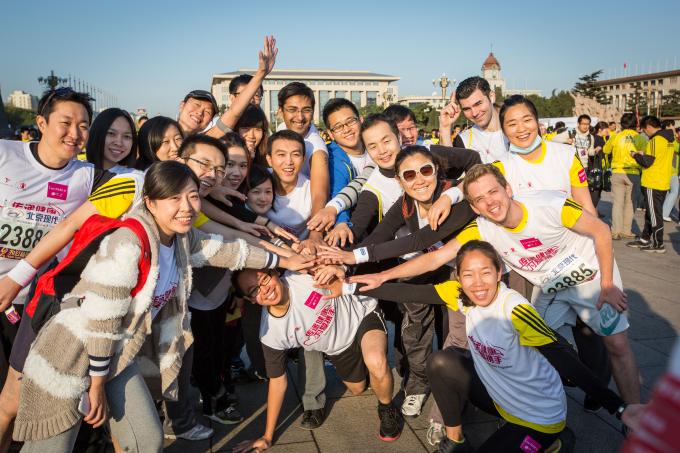2013 Beijing Marathon: Run for Health Workers!

On October 20th, 2013, a team of 50 Save the Children representatives – including local health workers from Beijing’s Haidian District, as well as staff members from sponsor Reckitt Benckiser – joined 30,000 other running enthusiasts in the 2013 Beijing Marathon.
This is the third year that Save the Children has used the Beijing Marathon as a platform to increase prospects for child survival, as well as accessibility to quality healthcare for children and mothers worldwide.
“Marathons have long been used as a form of raising awareness and funds for charitable causes,” said Qian Xiaofeng, Communications Manager for Save the Children in China. “We hope to raise more awareness on the importance of frontline health workers in reducing preventable child deaths. Many health workers have also been invited to run with us, and are now active advocates of our work.”
Qi Li Ge Er, a Mongolian doctor who is currently working in Beijing, is proud to be representing Save the Children for the second year in a row. “On behalf of all health workers, I would like to run for child survival. I think that Save the Children’s [EVERY ONE] campaign really resonates with me, which is why I would like to represent them in the Beijing Marathon.”
Save the Children is committed to tackling the worldwide shortage of health workers. In 2011, the organization released a report entitled No Child Out of Reach, which underscored the critical role of frontline health workers and midwives in ensuring child survival. However, the world still lacks a startling 3.5 million doctors, nurses, midwives, and community health workers, who are needed to prevent child deaths from common illnesses such as HIV/AIDS, tuberculosis, and malaria. This marked shortage of quality healthcare is especially apparent in China’s remote rural and ethnic minority areas.
While China has made promising strides in preventing child deaths, progress has not been made evenly across the country, explains Yang Ruikan, Health Advisor to Save the Children in China.
“Save the Children hopes to work with all levels of the government to provide training for frontline health workers in order to improve the quality and availability of maternal and child healthcare in poor, remote, mountainous and ethnic minority areas.”
 China
China